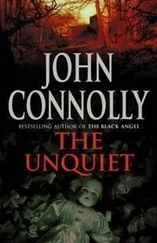“Shit,” hissed Louis. He considered their options. “Let’s take a look at the house, see if there’s any sign of movement.”
“What?” asked Angel. “You’re not going ahead without them?”
“I’m not doing anything yet. I just want to see the house.”
Now it was Angel’s turn to swear, but he followed Louis to the brow of the hill. The house lay before them, surrounded by a white picket fence. A lamp burned dimly in one of the upstairs windows, but otherwise all was quiet. Behind the house, the lake was a deeper patch of darkness extending toward unseen hills. Louis put a pair of binoculars to his eyes and scanned the property. Beside him, Angel did the same, although his attention was less on the house than on the deserted buildings behind him, so even as he looked to the north he was listening for the sounds of approach from the south.
They kept watch on the house for five minutes, and still the Endalls had not appeared. Angel was growing nervous.
“We need to-” began Angel, when Louis hushed him with a raised hand.
“That lit window,” he said.
Angel put the binoculars to his eyes once more, and barely caught sight of what had alerted Louis before the white drapes fell back into place again: a woman at the window, and then a man pulling her away. The woman had blond hair, and Angel had clearly seen her face, if only for a second.
It was Loretta Hoyle, Nicholas Hoyle’s deceased daughter, now apparently back from the dead.
“The last time we saw her, she was being eaten by hogs, right?” said Angel.
“That’s right.”
“She’s looking good on it.”
But already Louis was on his feet.
“We’ve been set up,” he said. “We’re out of here.”
Lynott and Marsh were sitting in their Tahoe. It turned out that they had certain shared tastes in music, among other things. Marsh had brought his iPod, and the stereo had an MP3 socket, so they were now listening to Stan Getz’s Voices. It was a little too close to the middle of the road for Lynott and did not, he felt, represent Getz at his best, but it was restful and suited his mood. From where they sat, just off a woodcutter’s trail, they could see any cars that might pass before them, and part of the bridge on the other side of the road, but they remained invisible among the trees. Only someone approaching from the west on foot would have a chance of seeing them, and then only if he got up close. In the event of that happening, the person in question would have reason to regret his proximity.
On the backseat of the Tahoe were eleven pint bottles of water, a large flask of coffee, four prepacked sandwiches, and some muffins and candy bars. Again, this was Marsh’s doing. Lynott had to give him credit for thinking ahead, even if he was starting to regret having some of the coffee and one of the bottles of water from the twelve-pack.
“I need to take a leak,” he said. “You want me to do it in the empty bottle?”
Marsh looked at Lynott as if he had just asked if Marsh would like it if he took a leak on him.
“Now why would I want you to do that? You think I get off on seeing men urinate in bottles? I don’t even get off on women doing that.”
“Just thought I’d ask,” said Lynott. “Some guys are sticklers for staying with the vehicle.”
“Not when it comes to anything below the waist I’m not. Go find yourself a little privacy.”
Lynott did as he was told. It was good to stretch his legs, and the air was cool and smelled of green leaves and clear water. He walked slowly into the woods, moving perpendicular to the gradient, taking care not to slip on the wet ground and fallen leaves. He found a suitable tree, then took a look over his shoulder to make sure that he still had the Tahoe in sight before turning his back and unzipping his fly. The only sound in the forest was the none-too-gentle trickle of liquid upon wood, and Lynott’s accompanying sigh of relief and contentment.
Suddenly, a third sound was added to the mix: the shattering of glass, and a noise that was somewhere between a sigh and a cough. Lynott identified it immediately, and his gun was in his right hand even as he used his left to tuck his member back into his pants, ignoring the unwelcome trickle that accompanied the move. He took two steps before something impacted on the back of his skull, and then he was dead before he even realized that he was dying.
Angel resisted telling Louis that he’d told him so.
They moved along opposite sides of the cattle pens, their guns always moving, sighting down the barrels on the empty doorways, the dark windows, alert for even the slightest sign of movement.
They reached the barn unchallenged. It seemed unchanged from when they had left it, its doors closed to hide the car within. They paused and listened intently, but heard nothing. Louis signaled to Angel to open the left door, counting down from three. Angel’s mouth was dry, and there was an ache in his belly. He licked some perspiration from his upper lip as Louis’s fingers silently made the count then, as the final finger fell, he yanked the door open.
“It’s clear,” said Louis, then added, “but it’s not good.”
The car was resting too low to the ground on one side, like a lopsided smile. The tires on the right had both been slashed. The driver’s-side window had been broken, and the hood had been raised and then allowed to fall back down without locking. Louis remained at the door, keeping watch, while Angel moved inside. He could detect no movement. An empty field stretched from the back of the barn toward the forest, but he could make out little in the distance apart from the shapes of the trees.
Angel squatted in front of the car and carefully raised the hood a fraction. He took a tiny Maglite from his pocket, switched it on, and held it between his teeth before picking up a piece of wood from the ground and slowly running it along the gap between the body of the car and the hood. There were no wires that he could find. He raised the hood a little farther with his left hand and, with the flashlight in his right, examined the engine. He could see no springs, no pads, no devices that might be activated by the raising of the hood. Nevertheless, he drew a deep breath before he lifted the hood fully. It took him only a moment to figure out what had been done. He could smell it before he saw it.
“They blew the fuse panel,” he said. “This baby isn’t going anywhere.”
“Guess we walk.”
“Kids?”
“You see the local gangbangers while we was passing through?”
“No, but this is, like, rural. Maybe they were hiding.”
“Yeah, ’cause they was so scared of the big city boys.”
Louis took one last look around, then stepped into the garage and headed straight for the trunk of the car. He put his finger upon the release button, then paused before pushing it and glanced at Angel.
“There was nothing up front,” said Angel.
“That’s reassuring. Maybe you want to take a couple of steps away, just in case.”
“Hey, if you go, I go, too.”
“Maybe I don’t want you to go, too.”
“You want someone to mourn for you later?”
“No, I just don’t want you with me for eternity. Now step the fuck back.”
Angel moved away. Louis hit the button, flinching only slightly as he did so. The trunk popped open, and Louis swore. Angel joined him.
Together, they stared into the trunk.
Weis and Blake had no music in their car, and they had long ago exhausted their store of mutual acquaintances. It did not trouble either of them. They were men who valued silence. Although, true to form, neither had said it aloud, each admired the other’s essential stillness. The inability to remain quiet and unmoving for long was one of the reasons Weis detested Lynott. Their paths had last crossed in Chad, where they had nominally been fighting on the same side, but Weis considered Lynott to be unprofessional, a thief, and a man of low morals. But then, Weis was a man who hated easily, and already he had begun to notice Blake’s breathing, which, stillness or no stillness, he felt was uncomfortably loud. There was nothing to be done about it, he supposed, short of suffocating him, and that seemed like an overreaction, even to Weis.
Читать дальше












